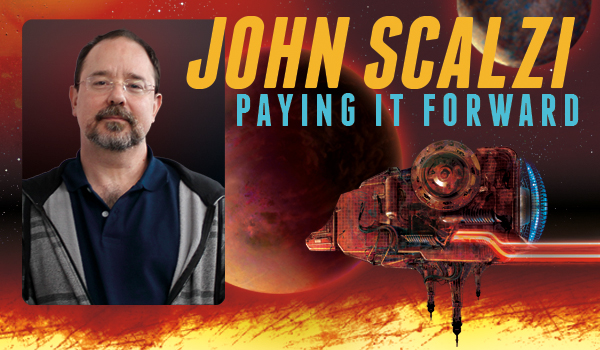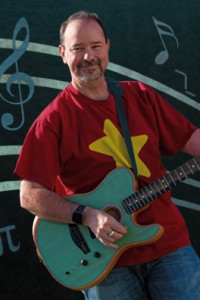John Scalzi: Paying It Forward

John Michael Scalzi II was born May 10, 1969, and grew up in Southern California, going to school in Claremont. He graduated from the Webb School in 1987 and attended the University of Chicago, where he became editor-in-chief of the Chicago Maroon and graduated with a philosophy degree in 1991. He moved back to California, where he became the film critic and later a columnist for the Fresno Bee. In 1996 he relocated to Washington DC to work for AOL as an in-house editor. In 1998 he became a full-time freelance writer, doing work for corporate clients in addition to reviewing and writing fiction. Scalzi is also a prominent blogger, with popular personal site Whatever, at whatever.scalzi.com.
Scalzi’s first SF novel was Agent to the Stars, posted on his website as ‘‘shareware’’ in 1999 (and published in print in 2005). Second novel Old Man’s War appeared on his website in 2002, where it was read by editor Patrick Nielsen Hayden, who subsequently purchased it for Tor. The novel appeared in print in 2005 and was a Hugo Award finalist. Other novels set in the same universe include The Ghost Brigades (2006), The Lost Colony (2007), Hugo and Norton Award finalist Zoe’s Tale (2008), The Human Division (2013), and The End of All Things (2015), plus assorted stories and chapbooks.
His humorous SF novel Redshirts (2012) won a Hugo Award. Other novels include The Android’s Dream (2006); Fuzzy Nation (2011), an authorized ‘‘reboot’’ of H. Beam Piper’s classic Little Fuzzy (1962); and Campbell Memorial Award finalist Lock In (2015).
He recently signed a 13-book contract with Tor (for ten adult novels and three YA), beginning with The Collapsing Empire (2017), first in the Interdependency series.
Though not a prolific story writer, Scalzi has published a few short pieces, notably standalone novelette The Sagan Diary (2007) set in the Old Man’s War Universe; Sidewise Award nominee ‘‘Missives from Possible Futures #1: Alternate History Search Results’’ (2008); dark science fantasy novella The God Engines (2009), a Hugo and Nebula Award finalist; Hugo nominee ‘‘Shadow War of the Night Dragons: Book One: The Dead City: Prologue’’ (2012); a novella in the Lock In universe, Unlocked: An Oral History of Haden’s Syndrome (2014); and audio original novella The Dispatcher (2016).
Scalzi edited an issue of Subterranean magazine dedicated to ‘‘science fiction clichés’’ in 2006 and Hugo-nominated shared-world anthology METAtropolis in 2008. His non-fiction includes The Rough Guide to Money Online (2000), The Rough Guide to the Universe (2003), The Rough Guide to Sci-Fi Movies (2005), and 24 Frames Into the Future: Scalzi on Science Fiction Film (2012). He also wrote the humorous Book of the Dumb series, beginning in 2003. Some of his blog posts have been compiled in You’re Not Fooling Anyone When You Take Your Laptop to a Coffee Shop; Scalzi on Writing (2007), Hugo Award winner Your Hate Mail Will Be Graded: Selected Writing, 1998-2008 (2008), and the forthcoming Don’t Live For Your Obituary.
Scalzi was nominated for the Best Fan Writer Hugo Awards in 2007 and 2008, winning the latter. He also won the Campbell Award for Best New Writer in 2006. Scalzi was elected president of SFWA in 2010, and served three terms, stepping down in 2013. He lives in Bradford OH with his wife, Kristine Blauser Scalzi (married 1995), and their daughter Athena.
Excerpts from the interview:
‘‘I did read a lot of science fiction when I was a kid. In some ways, they like to say that the golden age of science fiction is 13, and to that extent I think there’s some validity to that snarky comment, that a lot of science fiction when you’re 13, 14, right in that area, things just expand your brain and it’s something you want to read a lot of. The funny thing is that when I wrote my first novel, Agent to the Stars, I flipped a coin between writing a science fiction novel and a mystery novel. If it had landed tails instead of heads I would’ve had a completely different career. Who knows how that would have worked. I read science fiction, mystery, and contemporary fiction, so I was widely read – though science fiction, along with mystery, was really the genre I read the most and was most comfortable with. Even as a kid, those two genres were the ones that felt like home. And non-fiction – I read a lot of journalism and columns and stuff like that. I was a journalist and a columnist before I was a novelist.
‘‘I spent a lot of time in libraries as a kid. My mom worked during the day. She was a single mom most of the time, so I had to go somewhere to keep myself busy, and I would go to the library. The first book of science fiction that I specifically remember was Farmer in the Sky by Robert Heinlein. That was my science fiction introduction. After that, others came rapidly: the Madeline L’Engle books, The Dark Is Rising series by Susan Cooper. I tried reading Dune when I was 11 or 12, and it was a little more than I could process at that particular age, so I read it a couple years later. I had grown enough that it made sense to me by then.”
*
‘‘I’m still in SFWA. I’m just not president anymore. I think it’s good for the board to rotate through people. One of the great things about science fiction and fantasy is, despite its occasional blowups, it really does have the ethos of ‘pay it forward.’ That is ingrained into the culture of SF and fantasy. I did my time as President of SFWA because it was an opportunity to affect things directly and to help others affect things directly. There are things I do personally, like the Big Idea feature on Whatever, that I do because I have a platform, and most of the people who come to read my site are readers of science fiction and fantasy, so why not help promote folks that do that? It’s a really easy thing for me to do it because it’s the writers themselves saying, ‘This is why my book is interesting.’ I just give them the platform.”
*
‘‘Everything comes around cyclically. Space opera is having a moment right now, and part of the reason is because there’s stuff there, and people were writing it before there was a moment. That moment will go away, and people will still be writing it, because that’s what they want to write. I wrote Old Man’s War in 2005, and that was space opera-y. Maybe when it came out people were hankering for Heinleinesque stuff and that filled that particular void, but none of that goes away. Science fiction and fantasy as a ‘super genre,’ incorporating both, is wide and diverse and pretty robust. There are always going to be people doing weird stuff. There are always going to be people doing military science fiction, YA, epic fantasy, or urban fantasy, and there are always going to be people doing space opera. In the case of the Expanse, which I think is great, the two writers plugged away at those books because they thought it would be cool to do space opera. They were good at it. They benefited from Orbit doing a good job of marketing the series, and they benefited from it being turned into a TV series that gets a large amount of attention, both critically and commercially. But they also benefited from Old Man’s War coming out in 2005, they benefited from Ann Leckie winning every single award in the world for Ancillary Justice, they benefited probably indirectly but even so from Iain M. Banks, who was out there creating galaxy-spanning stuff, from Alastair Reynolds doing his thing, from David Weber and Peter Hamilton. All that stuff has been there the whole time, and when it spikes up like that, it’s great for everybody who’s been writing it, because we all benefit. But at the same time I don’t think they were doing it cynically – I think they were doing it because they love space opera.”
*
‘‘It’s not about what the writer intends – it’s what the reader sees. You can intend to write a book that has absolutely no political or social agenda at all, and somebody’s going to read it and interrogate the text from their own particular point of view. Despite your attempts to write a completely apolitical asocial thing, you can’t escape the fact that you are who you are, and you live in the culture you’re in, and you have some base-level assumptions, so they’re going to find things there to critique. Authors don’t have to do anything other than write a story. They can write a story and say, ‘I am going to be expressly polemical.’ Or they can say, ‘I’m not going to put any politics at all into it.’ Regardless of what you intend, who you are is going to come through. I have famously said that I don’t try to write one-to-one political parallels about what’s going on in the world today in my fiction because, among other things, the novels are universes. They run in a specific way, and the way they run doesn’t necessarily follow the broad brushstrokes of the real world. Nevertheless, I live in 2017. The issues of today are going to influence how I write, and who I am as a person will influence how I write. I don’t try to hammer people over the head. When I wrote Lock In, I never disclosed the gender of the main protagonist. We literally did not tell anybody about that before the book came out. I didn’t even tell my editor, Patrick Nielsen Hayden, when I submitted the manuscript. He only found out because I asked him, ‘What did you think of Chris?’ He said, ‘I think he’s a great character.’ I said, ‘Why do you think Chris is a he?’ He said, ‘You bastard.’ That was something that interested me. I didn’t necessarily call attention to it. I let people discover it. With Collapsing Empire, two of the three main characters are women. I don’t call attention to it, like, ‘Look at these strong women! I am a male author looking for cookies!’ I want to reflect what I see in my own world. I know so many strong capable, no-bullshit, no-compromise women in my own experience – starting with my own wife. It would be literally shameful for me not to represent that. Beyond that, you write the universes you want to see. I want to see a universe with women characters who are strong and capable and smart, and also women who are venal, incompetent, confused, or unhappy, just like in the real world. It’s easy for me to not put that in; I have defaults like everybody does, and I will default to dudes. I consciously make the effort to avoid that because I want a new norm. You don’t call attention to it – you just do it.”
*
‘‘For each new book, I try to do something new, to add a new tool to my toolbox. Sometimes it sounds really ridiculous. For Lock In, I didn’t use semicolons. That seems silly, right? But I can discourse. I can use the semicolons to keep a sentence going for a full page. As a result, by forcing myself not to use semicolons, the sentences are dynamic and punchy and it changes the rhythm of that book. With Collapsing Empire I tried two things successfully, and one unsuccessfully. The unsuccessful thing was trying to write in a more ‘epic mode,’ something Herbertesque. That failed miserably because the rhythm of Herbert’s language was something I needed to work on more, but not in this particular novel. I needed to write some short stories in a Herbert mode, and take what I learned from there. That didn’t work. The other thing I did was very specifically matching the omniscient voice to the character. That is not something that I had done when I had third person material before. It was important to me because it really sets the tone. In the chapters about Kiva, the narrative voice is as profane and no-nonsense efficient as she is. In the chapters with Cardenia, the new Emperor, the narration is a lot calmer, a little more uncertain. It’s much more controlled. Not that Herbert’s narration was uncontrolled – it was simply so far up. He had a Guild Navigator’s-eye view of things. It was important for me that you really know you’d switched from one character to another without having to go into first person, or that near-third-person viewpoint where you’re literally hovering over their shoulder. That kind of omniscient was something I had never done before, and I needed to try, so that I could have that tool in my toolbox later.”
*
‘‘You know the worst insult you can give a writer? Where you say they’ve become too big to edit. I’m mindful that I’m in a position where, to some extent, I don’t have anything left to prove. I’m a New York Times bestseller, I won a Hugo, I’m esteemed in my field. There are some people who hate me, but even that is a mark of accomplishment in a way. I don’t doubt my position in my field. I’m very comfortable. But comfort can lead to stagnation, and stagnation can lead to your downfall. I have a huge ego, and I think well of myself, so I have to be mindful that in fact I don’t know everything, and don’t become the arrogant mansplaining prick I could so easily become. Part of that is recognizing that for all my success and security, there’s more to do. More to do in writing, more to do as a participant in the field, and more to do in the community. The moment I decide, ‘This is it, here I am and you must deal with me,’ then everything shifts and becomes a completely different situation. It’s an internal battle. Defaulting to prickdom is super easy for me to do. ”







On the article “John Scalzi: Paying It Forward,” John Scalzi said,
“Part of that is recognizing that for all my success and security, there’s more to do. ”
He can start by paying more attention to the production of his books in Audio. Lately his titles have been exclusively narrated by Wil Wheaton. Wheaton is a terrible narrator. Scalzi’s audio titles deserve better. I won’t touch anything narrated by Wheaton, and many other Audible and Amazon reviewers have echoed this sentiment.